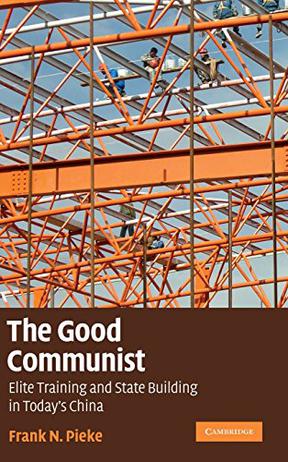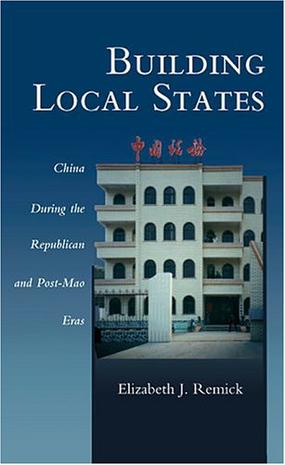-

The Dictator's Dilemma
Many observers predicted the collapse of the Chinese Communist Party following the Tiananmen Square crackdown in 1989, and again following the serial collapse of communist regimes behind the Iron Curtain. Their prediction, however, never proved true. Despite minor setbacks, China has experienced explosive economic growth and relative political stability ever since 1989. In The Dictator's Dilemma, eminent China scholar Bruce Dickson provides a comprehensive explanation for regime's continued survival and prosperity. Dickson contends that the popular media narrative of the party's impending implosion ignores some basic facts. The regime's policies may generate resentment and protest, but the CCP still enjoys a surprisingly high level of popular support. Nor is the party is not cut off from the people it governs. It consults with a wide range of specialists, stakeholders, and members of the general public in a selective yet extensive manner. Further, it tolerates and even encourages a growing and diverse civil society, even while restricting access to it. Today, the majority of Chinese people see the regime as increasingly democratic even though it does not allow political competition and its leaders are not accountable to the electorate. In short, while the Chinese people may prefer change, they prefer that it occurs within the existing political framework. In reaching this conclusion, Dickson draws upon original public opinion surveys, interviews, and published materials to explain why there is so much popular support for the regime. This basic stability is a familiar story to China specialists, but not to those whose knowledge of contemporary China is limited to the popular media. The Dictator's Dilemma, an engaging synthesis of how the CCP rules and its future prospects, will enlighten both audiences, and will be essential for anyone interested in understanding China's increasing importance in world politics. -

Powerful Patriots
What role do nationalism and popular protest play in China's foreign relations? Chinese authorities permitted anti-American demonstrations in 1999 but repressed them in 2001 during two crises in U.S.-China relations. Anti-Japanese protests were tolerated in 1985, 2005, and 2012 but banned in 1990 and 1996. Protests over Taiwan, the issue of greatest concern to Chinese nationalists, have never been allowed. To explain this variation, Powerful Patriots identifies the diplomatic as well as domestic factors that drive protest management in authoritarian states. Because nationalist protests are costly to repress and may turn against the government, allowing protests demonstrates resolve and makes compromise more costly in diplomatic relations. Repressing protests, by contrast, sends a credible signal of reassurance, facilitating diplomatic flexibility. Powerful Patriots traces China's management of dozens of nationalist protests and their consequences between 1985 and 2012. -

Growing Pains
As its miracle growth continues seemingly unabated into a fourth decade, China's emergence as a global economic and political power is accepted as inevitable. China is changing and the world is changing in response. Yet such radical transformation has also brought challenges that China must face if it is to continue its upward trajectory. Some of problems that are thought to threaten China's reforms are in fact not as serious as many interpreters claim —only growing pains of development. Some have already been solved. Other widely noted problems truly are serious, and still others may loom on the horizon. Growing Pains seeks to present an accurate view —as opposed to an optimistic or pessimistic one —of China's current reforms. Sorting the evidence of the problems' actual severity, the contributors consider hot-button issues —privatization and markets; governance; and questions of health care, environmental degradation, and social inequality —and consider the likelihood of near-term solutions. -

The Good Communist
Has China become just another capitalist country in a socialist cloak? Will the Chinese Communist Party's rule survive the next ten years of modernization and globalization? Frank Pieke investigates these conundrums in this fascinating account of how government officials are trained for placement in the Chinese Communist Party. Through in-depth interviews with staff members and aspiring trainees, he shows that while the Chinese Communist Party has undergone a radical transformation since the revolutionary years under Mao, it is still incumbent upon cadres, who are selected through a highly rigorous process, to be ideologically and politically committed to the party. It is the lessons learnt through their teachers that shape the political and economic decisions they will make in power. The book offers unique insights into the structure and the ideological culture of the Chinese government, and how it has reinvented itself over the last three decades as a neo-socialist state. -

Building Local States
-

The Paradox of China's Post-Mao Reforms
China's bold program of reforms launched in the late 1970s--the move to a market economy and the opening to the outside world--ended the political chaos and economic stagnation of the Cultural Revolution and sparked China's unprecedented economic boom. Yet, while the reforms made possible a rising standard of living for the majority of China's population, they came at the cost of a weakening central government, increasing inequalities, and fragmenting society. The essays of Barry Naughton, Joseph Fewsmith, Paul H. B. Godwin, Murray Scot Tanner, Lianjiang Li and Kevin J. O'Brien, Tianjian Shi, Martin King Whyte, Thomas P. Bernstein, Dorothy J. Solinger, David S. G. Goodman, Kristen Parris, Merle Goldman, Elizabeth J. Perry, and Richard Baum and Alexei Shevchenko analyze the contradictory impact of China's economic reforms on its political system and social structure. They explore the changing patterns of the relationship between state and society that may have more profound significance for China than all the revolutionary movements that have convulsed it through most of the twentieth century.